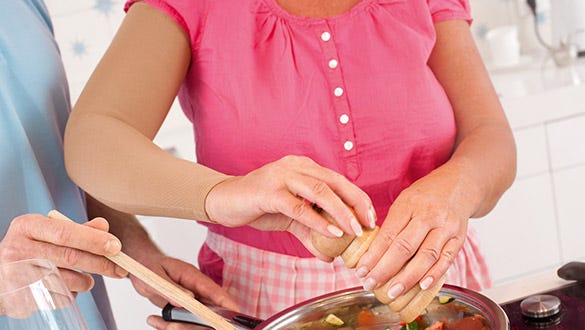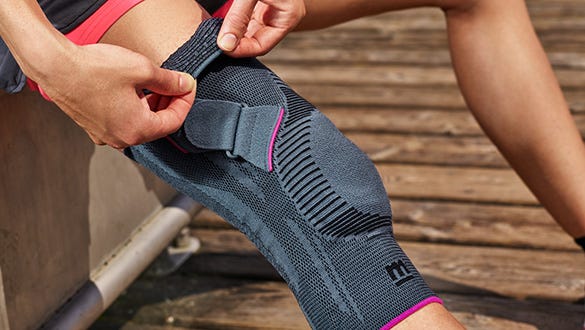- Free First Class Delivery
- Buyer Protection
- Secure Online Shopping
- Healthcare Professional? Click here
Nutrition for arthrosis
Arthrosis and arthritis are often referred to as the same condition, however arthritis is the result of inflammation of the membrane covering the joints which over time attacks the bone and surrounding cartilage and arthrosis has a degenerative component (wear and tear), also known as Osteoarthritis (OA).


Categories
Why is a healthy diet so important for arthrosis sufferers?
Diet and body weight have a significant influence on the development and treatment of arthrosis. How much you eat and what you eat really does matter.
Being overweight poses health risks in the long term. It puts additional strain on the joints thus adding more wear and tear than in people of a healthier weight. This is way it is important if you suffer from arthrosis, and are overweight, that you should consider a change of diet (after consulting your doctor).
Study: Connection between being overweight and the development of knee arthrosis (gonarthrosis)
In an Australian study, scientists investigated the relationship between being overweight and knee arthrosis: Patients of a healthy weight only developed knee arthrosis at an older age. Young, healthy but overweight patients saw a decrease in cartilage at a younger age.*
Overweight people therefore often suffer more from joint wear and joint pain than those of a healthier weight. Therefore, more often than not; the clinician often advises their arthrosis patients to lose weight.
What does nutrition have to do with arthrosis and joint metabolism
Synovial fluid is nutrient rich and is vital for the joint metabolism. Your diet affects the quality of your synovial fluid. The joint cartilage must be continuously supplied with nutrients contained within the synovial fluid. These are absorbed from the food that we eat.
Blood transports the mineral, sugar and protein to the synovial fluid. Important joint components are: glucosamine sulphate, chondroitin sulphate, collagen hydrolysate and hyaluronic acid. They bind water to themselves and allow the joints to slide smoothly. The avascular cartilage can only absorb nutrients through movement. If there is a deficiency, the cartilage breaks down. Once the cartilage is destroyed, the bones rub directly against one another.
Therefore, it is vital to support your joint metabolism with lots of movement and the right nutrition.
For example:
- Vegetables, herbs, spices and fruit
- lean and low-fat dairy products
- vegetable oils and fats, such as linseed oil, olive oil, rapeseed oil, avocado oil, etc
- wholegrain products, seeds and nuts
- cold water fish
Spices for arthrosis
Believe it or not, certain spices have an anti-inflammatory and analgesic effect on your body. When used properly, they can even support arthrosis therapy. Both Indian Ayurvedic teachings and Chinese medicine use spices to treat arthrosis.
Turmeric Anti-inflammatory
Turmeric contains curcumin, which can counteract inflammation. As a result, the joint swelling may go down enabling the patient to become more mobile. A study by the Western Ontario and McMaster Universities of Canada (WOMAC) confirmed the beneficial effects of turmeric in arthrosis.**
Ginger improves circulation
Ginger also in known for promoting blood circulation and also has anti-inflammatory properties. For arthrosis it can be used externally and internally: Arthrosis patients can apply ginger paste or oil directly onto the joint or drink it as a tea to feel the effect “from the inside”.
Chili Analgesic
Chillies contain capsaicin, which is said to have anti-inflammatory and analgesic properties. Arthrosis patients can rub capsaicin cream onto the affected area.
Cumin, nutmeg and coriander Anti-inflammatory
Chillies contain capsaicin, which is said to have anti-inflammatory and analgesic properties. Arthrosis patients can rub capsaicin cream onto the affected area.
Preventing arthrosis: Take care when consuming animal fats and omega-6 fatty acids
A change in diet may not cure arthrosis, but it can help to improve therapy and ease discomfort. It is recommended that patients with arthrosis should avoid the following foods or at least consume them in moderation:
- red meat
- dairy products
- eggs
- coffee
- alcohol
- fast food and ready meals
Animal fats should also be cut back on as they contain arachidonic acid which is an omega-6 fatty acid. This can promote an inflammatory response in the joint and cartilage area. Offal, such as liver, lard, liver sausage, eggs and seafood, have particularly high levels of arachidonic acid.
Arthrosis patients should also avoid reaching for ready meals or fast food as these meals are high in calories and most have practically no nutritional value.
Overview of nutrition for arthrosis
It is crucial to provide the joints with vitamins, minerals, trace elements and secondary plant compounds throughout your life. Secondary plant compounds such as olive polyphenols, extracted from the olive, protect the joints against oxidative stress and have anti-inflammatory effects.***
| Foods | Therapy-supporting | Therapy-inhibiting |
| Beverages | water, unsweetened ginger or herbal tea, unsweetened almond or oat drinks | drinking chocolate, fruit nectar, soy drinks, soft drinks, alcohol |
| Fruit (1 handful daily) | apple, berries, clementine, kiwi, nectarine, peach, plum, sour cherry, watermelon | dried fruit, physalis |
| Vegetables (3 handfuls daily) | beans, peas, fennel, cucumber, cabbage, lentils, chard, mushrooms, peppers, lettuce, sauerkraut, asparagus, spinach, tomatoes, zucchini | buttered frozen vegetables |
| Nuts & seeds (20 g daily) | almonds, cashew nuts, pine nuts, sunflower seeds, pumpkin seeds, hazelnuts and walnuts | peanuts, salted nuts |
| Fats & oils (2 tbsp. daily) | olive oil, rapeseed oil, walnut oil, linseed oil, wheat germ oil | clarified butter, palm oil, mayonnaise, sunflower oil, safflower oil |
| Cereals & side dishes (2 handfuls daily) | spelt, oat flakes, jacket potatoes, wholegrain products, millet | white bread, rusk, croissant, peeled rice, durum wheat pasta, French fries and fast food in general, ready meals, crispbread |
| Lean meat & sausage (100 g weekly) | chicken and turkey, corned beef, beef fillet | pork, breaded meat |
| Fish & seafood (2 servings weekly) | trout, halibut, herring, cod, salmon, mackerel, sardine, plaice, turbot, shrimps, crabs | breaded fish |
| Eggs, milk & cheese | maximum two eggs per week, otherwise daily low-fat milk and dairy products such as buttermilk, natural yoghurt, quark (up to 20 percent fat), cheese with maximum 45 percent fat content | fruit buttermilk, fruit yoghurt, rice pudding, pudding, cream quark |
More information
*Ding, C., Cicuttini, F., Scott, F., Cooley, B., Jones C. (2006) Natural history of knee cartilage defects and factors affecting change.
**IFT (2011) Curcumin may relieve pain, inflammation for osteoarthritis patients, available online at: www.ift.org/food-technology/daily-news/2011/january/11/curcumin-may-relieve-pain-inflammation-for-osteoarthritis-patients.aspx (Last accessed: 18.01.2019)
***Bolewski, J. (2014) Ernährung bei Arthrose, available online at: eatsmarter.de/ernaehrung/bei-krankheiten/ernaehrung-bei-arthrose (Last accessed: 21.01.2019)









